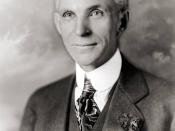1.0 Introduction
It is a common understanding that a manager's role is to manage. But how do they manage in today's rapidly changing world? How do they resolve problems that they have never faced before? Can managers still apply the rational analysis, the management theory, the problem solving and decision-making methods into practice?
To answer the above questions, we need to understand the meaning of management, the characteristic of today's organizational life, and the relation between theories and practices.
As defined by Richard L. Daft in Management Sixth Edition (2003), "Management is the attainment of organizational goals in an effective and efficient manner through planning, organizing, leading and controlling organizational resources."(P5) Thus to be successful, managers should be able to achieve the organizational goal effectively and efficiently. According to Henri Fayol's description, what managers do is "plan, organize, coordinate, direct, and control" (Henri Fayol, 1949). This description "provides a broad overview of managerial activities, but it is also very general and does not give us a sense of what managers do every day" (Gregory M.
Bounds, Gregory H. Dobbins, Oscar S. Fowler. 1995 P.7). Therefore Henry Mintzberg, "who followed managers around and recorded all their activities" (Henry Mintzberg, 1973) worked out the answer for what managers actually do to plan, organize, lead and control - the description of managerial work that included three general characteristics and ten roles: "Interpersonal (figurehead, leader, liaison), Informational (monitor, disseminator, spokesman), and Decisional Roles (entrepreneur, disturbance handler, resource allocator, negotiator)" (Bounds, et al 1995 P.8-9). The two descriptions are just different ways of looking at management. Today's ambiguous and uncertain organizational life has created difficulty for managers to achieve organizational goals effectively and efficiently.
1.1 Today's managers face ambiguous, uncertain and complex situations
"Uncertainty means the manager has insufficient information to know the consequences of...


